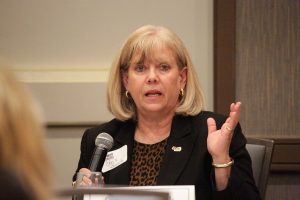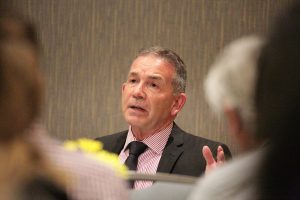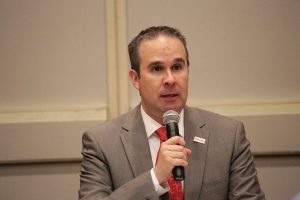
As the summer break drew to a close, Tempe’s three school superintendents spoke to the city’s chamber of commerce about their plans and hopes, as well as the challenges they’ll face, during the 2015-2016 school year.
Christine Busch, superintendent of Tempe elementary schools, said that although the district had to close four schools a few years back, they reopened them, with McKemy Middle School becoming Tempe Academy of International Studies. It’s an open-enrollment school that offers the International Baccalaureate program to academically bright students.
“It’s a very exciting time to be in Tempe Elementary,” Busch said. “We have such a generous community that we’ve been able to pass our bonds and overrides over the last few years, so many of you are able to see the results of what we’re doing.”
Feedback from parents and students has led the district to change the time classes begin at middle schools. “No more 7:05 start times,” Busch said.
Dr. David Schauer, superintendent of the Kyrene School District, also noted the generous support of the community in his remarks.

“These three districts work very closely. Our goal is to have a seamless, K through 12 system for all of our families,” Schauer said. He noted the more personalized learning environments that the district has developed.
“That rigid, grade-level system…is really being transformed into a system that meets the needs of individual children, and not only their needs but their interests, their strengths, their desires, to keep them engaged in the learning process.”
Schauer, who will retire at the end of the coming school year, said one of his concerns is that all 17,000 students in the district have access to technology throughout the day.
Another Kyrene objective is to help middle school students stay engaged in their education. Younger students he said, are more excited about learning but kids begin to lose interest in learning around sixth grade.
“We have to keep them with us so they don’t get discouraged and have things happen to them that we wouldn’t want to happen.”
Funding continues to be an issue and Schauer said they are “looking at creative ways to deal with this shortage of resources and instead of the traditional cutting this, cutting that.”

Dr. Kenneth Baca, superintendent of the Tempe Union High School District, said he was proud that five of the six TUHSD schools had received the A+ Education of Excellence award by the Arizona Teaching Foundation.
The big thing for the new school year, he said, will be the accreditation process for the schools, and Baca spoke highly of TUHSD students’ academic achievement. He also touted the district’s excellence in fine arts and athletics.
“We continue to lead the pack in regard to the number of National Merit semi-finalists and finalists, and for the last five years we continue to have more Flinn Scholars than any other school district in Arizona,” Baca said.
Beyond that, he saluted the teachers who work in the district.
“It’s the teachers that truly make the difference as to what goes on in the classrooms,” Baca said.
He pointed to the $25 million in the capital budget that TUHSD has lost since 2008. Where the state once paid $567 per student, that number has dropped to $79. One textbook might cost over $100, he said. It’s not just teachers’ salaries, and class size that pose budget issues, he emphasized, it’s providing “instructional materials that teachers need to do what they do so well. The biggest challenge we face is being able to go out to our community and ask for a continuation and our capital override.”
All three superintendents were asked what the community could do to assist them. Baca and Busch both asked that people in the community become advocates for education and that they appreciate and value teachers.
“Let them know that we value them, that we know they are key to our economic growth, they are a key to the safety of this nation, that they are the key to ensure that we can enjoy the freedoms that we have as Americans. The teachers are the ones that truly make a difference,” Baca said.
Teachers, Busch said, “have the hardest job in the world. They work 70, 80 hours a week. Many work six or seven days a week or have a second or third job so they can support a family.”
She hopes people will vote to support officials that “fund teachers and students instead of prisons because the difference is about $4,500 per student versus $35,000 per prisoners.”
Schauer, for his part, pointed to teaching being perceived as a less desirable career and the “obsolete school calendar” that originated 150 years ago for a more agrarian society.
“I’ve always been an advocate of stretching that out through the whole year and giving people time during the school year to plan, reflect and work on the things they need to.”
If the number of days in the school calendar were to increase, compensation for teachers would increase, he said. The whole community needs to get behind an effort to change the school calendar, he said.
Busch said she was also concerned about compensation for teachers and noted that teachers were leaving the state of Arizona “in droves and going to work in other states where they’re compensated in a way where they’re respected in a stronger way by those who make policy.”
In terms of challenges during the coming year, Schauer pointed to families that are in turmoil and struggling. “Someone might live in a really nice home but they have no money for groceries and they’re trying to figure out how to get by. Basically it’s the decline of the middle class that’s going on,” he said.
Baca said his concern is that students feel both self-confident and safe whether they are at school or at home.
“We need to let our students know that nothing’s impossible and to give them that self-confidence within themselves that they can do anything.”
Schauer spoke of “the lack of equity” in that many children don’t have access to all-day kindergarten. The state of Arizona does not pay for all-day kindergarten and some districts have manage to provide it by taking money from other places. The schools need to make sure no one is left out, he said.
“No matter what your background is or how they come to us, it’s our responsibility to see to it that they learn.”
Busch said students need “state and national leaders who are willing to go to bat for them and believe that by supporting them and helping them be successful.”
And though there are many issues to surmount in the coming year, Baca offered an optimistic appraisal to end the session.
“Regardless of all those challenges that are out there, we’re going to come together as a community and overcome them,” Baca said.

